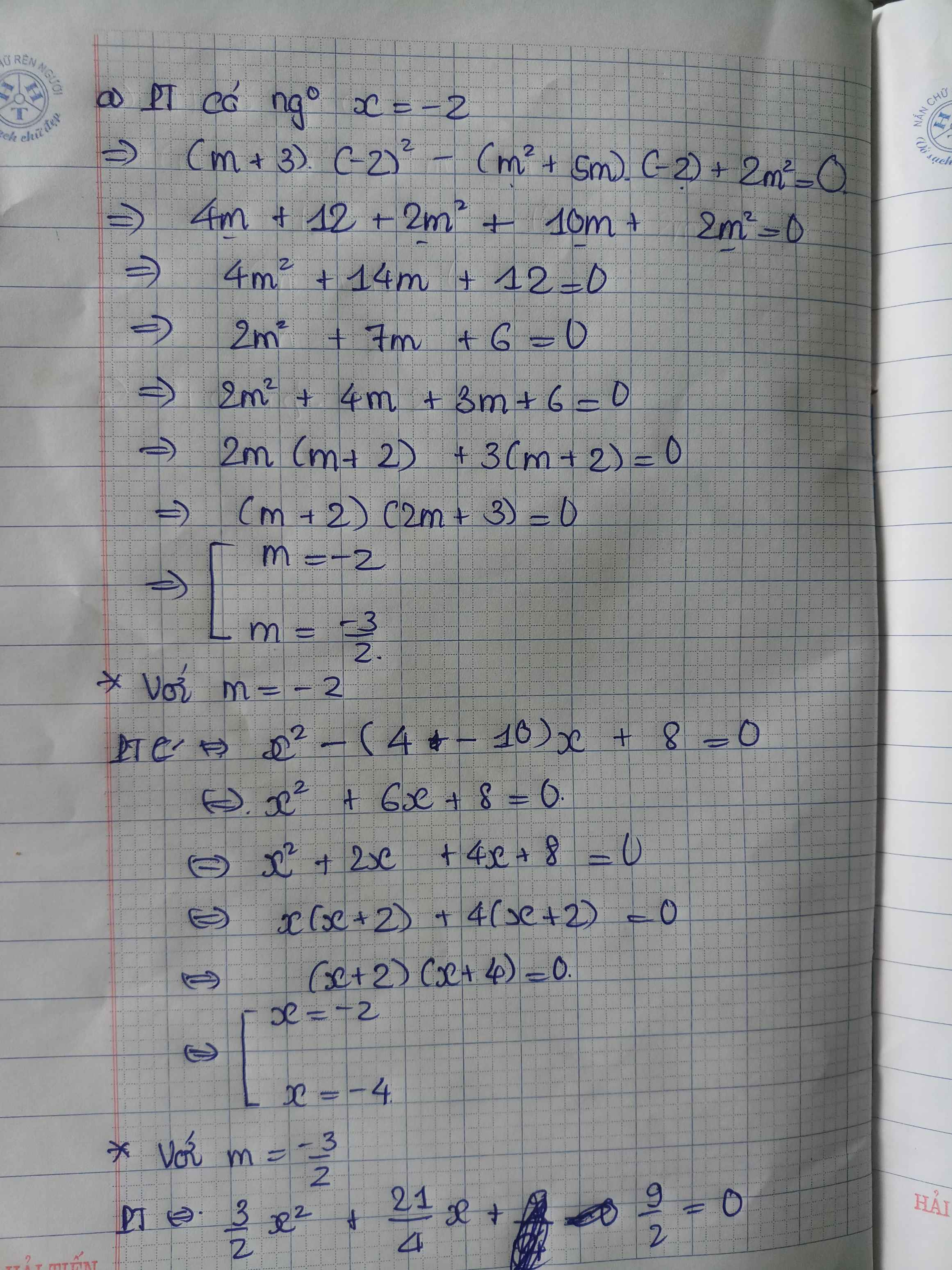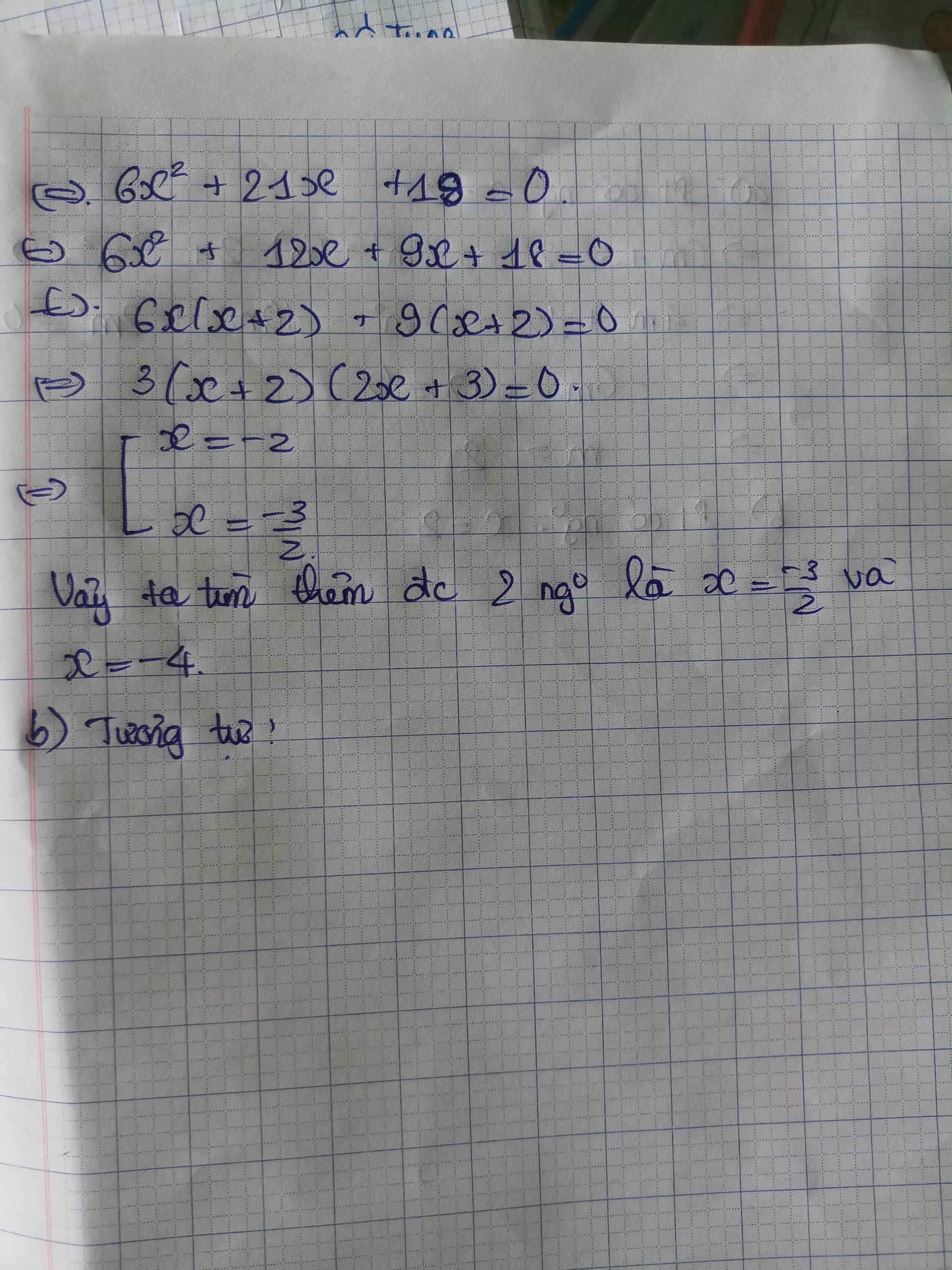Cho phương trình: \(x^2-3\left(m-1\right)x+2m-4=0\). Tìm m để phương trình có một nghiệm x = 2 và tìm nghiệm còn lại
Hãy nhập câu hỏi của bạn vào đây, nếu là tài khoản VIP, bạn sẽ được ưu tiên trả lời.


b) Thay x=2 vào pt, ta được:
\(4\left(m^2-1\right)-4m+m^2+m+4=0\)
\(\Leftrightarrow4m^2-4-4m+m^2+m+4=0\)
\(\Leftrightarrow5m^2-3m=0\)
\(\Leftrightarrow m\left(5m-3\right)=0\)
\(\Leftrightarrow\left[{}\begin{matrix}m=0\\m=\dfrac{3}{5}\end{matrix}\right.\)
Áp dụng hệ thức Vi-et, ta được:
\(x_1+x_2=\dfrac{2m}{m^2-1}\)
\(\Leftrightarrow\left[{}\begin{matrix}x_2+2=0\\x_2+2=\dfrac{6}{5}:\left(\dfrac{36}{25}-1\right)=\dfrac{30}{11}\end{matrix}\right.\Leftrightarrow\left[{}\begin{matrix}x_2=-2\\x_2=\dfrac{8}{11}\end{matrix}\right.\)

b: Thay x=-5 vào pt, ta được:
\(m+25+65=0\)
hay m=-90
Theo đề, ta có: \(x_1+x_2=13\)
nên \(x_2=18\)
c: Thay x=-3 vào pt, ta được:
\(18+3\left(m+4\right)+m=0\)
=>4m+30=0
hay m=-15/2
Theo đề, ta có: \(x_1\cdot x_2=-\dfrac{m}{2}=\dfrac{15}{4}\)
hay \(x_2=-1.25\)

Để PT có nghiệm bằng \(-1\), thay \(x=-1\) ta có:
\(\left(-1\right)^2-\left(2m-3\right)\left(-1\right)+m^2=0\\ \Leftrightarrow1+2m-3+m^2=0\\ \Leftrightarrow m^2+2m-2=0\Leftrightarrow\left[{}\begin{matrix}m=-1+\sqrt{3}\\m=-1-\sqrt{3}\end{matrix}\right.\)
Với \(m=-1+\sqrt{3}\Rightarrow x_1x_2=m^2=4-2\sqrt{3}\Rightarrow x_2=-4+2\sqrt{3}\)
Với \(m=-1-\sqrt{3}\Rightarrow x_1x_2=m^2=4+2\sqrt{3}\Rightarrow x_2=-4-2\sqrt{3}\)
Để pt đã cho có nghiệm bằng -1 thì \(1-\left[-\left(2m-3\right)\right]+m^2=0\)\(\Leftrightarrow1+2m-3+m^2=0\)\(\Leftrightarrow m^2+2m-2=0\)\(\Leftrightarrow\left(m+1\right)^2-\left(\sqrt{3}\right)^2=0\)\(\Leftrightarrow\left(m+1+\sqrt{3}\right)\left(m+1-\sqrt{3}\right)=0\)\(\Leftrightarrow m=-1\pm\sqrt{3}\)
Khi đó nghiệm còn lại bằng \(\dfrac{m^2}{1}=\left(-1\pm\sqrt{3}\right)^2=4\mp2\sqrt{3}\)
Khi \(m=-1+\sqrt{3}\) thì nghiệm còn lại bằng \(4-2\sqrt{3}\)
Khi \(m=-1-\sqrt{3}\) thì nghiệm còn lại bằng \(4+2\sqrt{3}\)

a. Bạn tự giải
b. Pt có nghiệm kép khi:
\(\Delta'=\left(m+1\right)^2-4m=0\Leftrightarrow m^2-2m+1=0\Leftrightarrow m=1\)
Khi đó: \(x_{1,2}=m+1=2\)
c. Do pt có nghiệm bằng 4:
\(\Rightarrow4^2-2\left(m+1\right).4+4m=0\)
\(\Leftrightarrow8-4m=0\Rightarrow m=2\)
\(x_1x_2=4m\Rightarrow x_2=\dfrac{4m}{x_1}=\dfrac{4.2}{4}=2\)

a: Thay m=3 vào pt, ta được:
\(x^2-2\cdot\left(3-1\right)x+3^2-2\cdot3=0\)
\(\Leftrightarrow x^2-4x+3=0\)
=>(x-1)(x-3)=0
=>x=1 hoặc x=3
b: \(\text{Δ}=\left[-2\left(m-1\right)\right]^2-4\left(m^2-2m\right)\)
\(=\left(2m-2\right)^2-4\left(m^2-2m\right)\)
\(=4m^2-8m+4-4m^2+8m=4>0\)
Do đó: Phương trình luôn có hai nghiệm phân biệt
Thay x=-2 vào pt, ta được:
\(\left(-2\right)^2-2\cdot\left(-2\right)\cdot\left(m-1\right)+m^2-2m=0\)
\(\Leftrightarrow m^2-2m+4+4\left(m-1\right)=0\)
\(\Leftrightarrow m^2-2m+4+4m-4=0\)
=>m(m+2)=0
=>m=0 hoặc m=-2
Theo hệ thức Vi-et, ta được:
\(x_1+x_2=2\left(m-1\right)\)
\(\Leftrightarrow\left[{}\begin{matrix}x_2-2=2\cdot\left(-1\right)=-2\\x_2-2=2\cdot\left(-3\right)=-6\end{matrix}\right.\Leftrightarrow\left[{}\begin{matrix}x_2=0\\x_2=-4\end{matrix}\right.\)
c: \(x_1^2+x_2^2=4\)
\(\Leftrightarrow\left(x_1+x_2\right)^2-2x_1x_2=4\)
\(\Leftrightarrow\left(2m-2\right)^2-2\left(m^2-2m\right)=4\)
\(\Leftrightarrow4m^2-8m+4-2m^2+4m-4=0\)
\(\Leftrightarrow2m^2-4m=0\)
=>2m(m-2)=0
=>m=0 hoặc m=2

a: \(\Leftrightarrow\left(2m+1\right)^2-4\left(m^2-3\right)=0\)
\(\Leftrightarrow4m^2+4m+1-4m^2+12=0\)
=>4m=-13
hay m=-13/4
c: \(\Leftrightarrow\left(2m-2\right)^2-4m^2>=0\)
\(\Leftrightarrow4m^2-8m+4-4m^2>=0\)
=>-8m>=-4
hay m<=1/2

1) điều kiện của m: m khác 5/2
thế x=2 vào pt1 ta đc:
(2m-5)*4 - 4(m-1)+3=0 <=> 8m-20-4m+4+3=0<=> 4m = 13 <=> m=13/4 (nhận)
lập △'=[-(m-1)]2-*(2m-5)*3 = (m-4)2
vì (m-4)2 ≥ 0 nên phương trình có nghiệm kép => x1= x2 =2
3) vì △'≥0 với mọi m nên phương trình đã cho có nghiệm với mọi m

`B4:`
`a)` Thay `x=3` vào ptr:
`3^3-3^2-9.3-9m=0<=>m=-1`
`b)` Thay `m=-1` vào ptr có: `x^3-x^2-9x+9=0`
`<=>x^2(x-1)-9(x-1)=0`
`<=>(x-1)(x-3)(x+3)=0<=>[(x=1),(x=+-3):}`
`B5:`
`a)` Thay `x=-2` vào có: `(-2)^3-(m^2-m+7).(-2)-3(m^2-m-2)=0`
`<=>-8+2m^2-2m+14-3m^2+3m+6=0`
`<=>-m^2+m+12=0<=>(m-4)(m+3)=0<=>[(m=4),(m=-3):}`
`b)`
`@` Với `m=4` có: `x^3-(4^2-4+7)x-3(4^2-4-2)=0`
`<=>x^3-19x-30=0`
`<=>x^3-5x^2+5x^2-25x+6x-30=0`
`<=>(x-5)(x^2+5x+6)=0`
`<=>(x-5)(x+2)(x+3)=0<=>[(x=5),(x=-2),(x=-3):}`
`@` Với `m=-3` có: `x^3-[(-3)^2-(-3)+7]x-3[(-3)^2-(-3)-2]=0`
`<=>x^3-19x-30=0<=>[(x=5),(x=-2),(x=-3):}`


PT có nghiệm $x_1=2$
\(\Leftrightarrow4-6\left(m-1\right)+2m-4=0\\ \Leftrightarrow6-4m=0\Leftrightarrow m=\dfrac{3}{2}\)
Theo Vi-ét: \(x_1+x_2=3\left(m-1\right)=\dfrac{3}{2}\)
\(\Leftrightarrow2+x_2=\dfrac{3}{2}\Leftrightarrow x_2=-\dfrac{1}{2}\)
Vậy nghiệm còn lại là $-\frac{1}{2}$